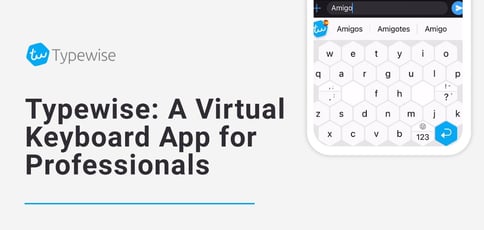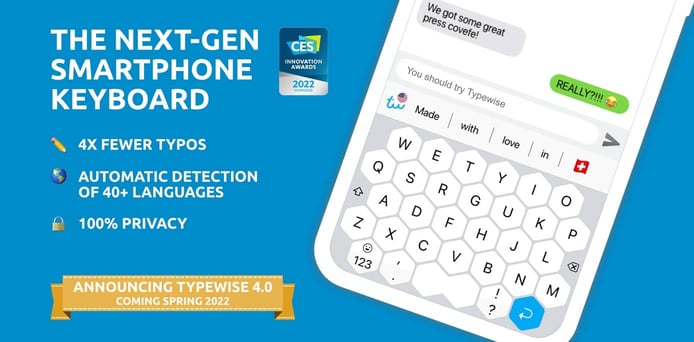
TL; DR: Typewise is a virtual keyboard app developed with a proprietary hexagonal matrix layout that minimizes typing errors on mobile devices. The app also leverages a predictive AI-based typing engine that suggests words based on context and multilingual language support. Typewise focuses on privacy, and all text processing occurs on individual devices, not in the cloud.
Most 21st century smartphones continue to use the 19th century QWERTY keyboard layout for their touchscreen keyboards. Attempts to improve on the QWERTY concept have primarily been based on a rearrangement of the alpha-numeric character sequence. But few take a fresh approach to manually typing characters into an electronic device.
Typing out messages, emails, or documents on mobile touchscreens can be time-consuming for many users, especially if they lack dexterity. Many people now use their thumbs to input the characters, but QWERTY keyboards aren’t optimized for that task.
In 2019 a team of academic researchers analyzed the typing speed of tens of thousands of users on both smartphones and conventional computers. Their main finding was that typing speeds on smartphones are now catching up with typing speeds on physical keyboards. The best predictor of performance, the study found, is whether users used one finger or both thumbs to type on a mobile device.
Participants using two thumbs on their mobile devices were able to type 38 words per minute, on average, only about 25% slower than the typing speeds researchers observed in a similar study of physical keyboard use. Study participants, who ranged in age, reported spending about six hours a day, on average, on their mobile device.

The study’s findings highlight the work of developers at Swiss software startup Typewise AG. The company created Typewise, a virtual keyboard app for Android and iOS devices that features a proprietary hexagonal keyboard layout with a predictive typing engine that suggests the next word based on context. It also has multilingual language support which recognizes more than 40 languages.
Typewise AG, founded in 2019, creates products that aim to “decode human thoughts” and translate them to technology. The Zurich-based deep tech company certainly likes to think big.
“Our smartphone keyboard app is the first step toward our goal to eventually power every human-machine interaction with our technology across mobile, desktop, wearables, and even brain-computer interfaces,” said Sam Baldwin, Head of Content and PR at Typewise.
Send Emails, Messages, and Documents Quickly and with Fewer Mistakes
Typewise developed its hexagonal layout keyboard specifically so users could type with two thumbs. The touchscreen keyboard replaced the up, shift, and backspace keys with swipe gestures to edit the text.
Users can delete text with a swipe left, and deleted text is reinstated with a swipe back to the right. Letters can be capitalized by swiping up or lowercased by swiping down on the key. Diacritics, or glyphs added to letters, can be added by pressing and holding the corresponding letter key.
Typewise’s hexagon keys are slightly bigger than those on a standard smartphone keyboard, and its optimized arrangement means fewer typos.
“If users still prefer to use the classic QWERTY layout, they can also select that on Typewise,” Sam said. “They still benefit from its autocorrect AI, privacy, and our language-recognition tech features.”

Typewise conducted extensive testing to develop the optimal keyboard layout and key shape that would allow for the fastest typing and the fewest typos.
“Current interaction with our digital devices happens only at 10% of the speed of our thoughts. Given that we spend an average of more than 6.5 hours on our digital devices every day, the result is a massive loss of productivity.”
Typewise’s core technology draws on text prediction, which consists of auto-corrections and word-completion functionality. The text prediction technology leverages AI, machine learning, and natural language processing (NLP) to correct and complete words — or sentences — as users write them.
“We built our autocorrection functionality using our own AI and designed it so that it could provide a superior typing experience out of the box,” Sam said. “We also enabled the feature to learn any user’s self-styled slang or colloquial vocabulary. So over time, it gets even better at fixing those stylistic characteristics.”
The Typewise keyboard app supports more than 40 languages, Sam said, and allows typing in multiple languages simultaneously using algorithmic language recognition.
AI Text Processing Reduces Autocorrect Errors and Ensures Privacy
Typewise AG collaborates with ETH Zurich’s Data Analytics Lab, which is supported by Innosuisse, Switzerland’s innovation agency, to further develop the technology. The company developed the Typewise app AI with the Swiss science institute ETH Zurich to power text prediction for the keyboard.
“We found that Google Gboard, Microsoft SwiftKey, and the Apple virtual keyboard were often not providing the best autocorrect experience,” said Sam. “Users complained of autocorrect errors, with these smartphone keyboards either being overzealous or not making typing corrections when they should.”

Typewise’s text prediction AI runs offline, entirely on the user’s device. That is important in light of privacy concerns about transmitting potentially sensitive user-typed data over the internet.
Many competing keyboard apps transmit user typing data to the cloud. While those keyboards are generally considered secure, Sam said the Typewise team felt the only way to ensure complete typing privacy was to build privacy into the design.
“Typewise is, first and foremost, a private and secure smartphone keyboard,” Sam said. “We believe privacy and security are essential. If a user’s data is transferred somewhere else, it’s always possible that it could be used for advertising or even for some nefarious purpose. The market for our software, we believe, is driven by its focus on assured privacy.”
Users Can Vote for New Features as a Desktop Version Nears Launch
The start of 2022 heralds a busy year for the Typewise AG team. The company has already launched a Typewise API (beta) that is based on OpenAPI 3 specifications and integrates into any application.
It also plans to launch a desktop version of the Typewise app early in 2022. According to the company, the desktop version will have all the features of the smartphone app and more dedicated tools.
And Typewise AG is preparing a new version of its flagship smartphone app for launch. Typewise 4.0 promises new features and fixes, plus improved onboarding support.
“Onboarding has been a bit of a challenge,” said Sam. “Typically, users take between three days and two weeks to become fully comfortable with using the app. We realized that we had to help people get to grips faster so that they could start to see value from Typewise more quickly, so we plan to speed up the learning period.”
Sam said that, while Typewise may take time to get used to, once users get up and running, the quantifiable time savings will make up for the initial learning curve.
Additional features in the forthcoming version of Typewise have been informed by feedback from its dedicated user base.
“We are greatly guided by user experience as it is fed back to us,” Sam said. “We have a Typewise beta test group, along with other feedback groups. We garner comments via online polls. Participants — Typewise users — can vote for a feature or a bug fix they would most like to see added to the app.”
HostingAdvice.com is a free online resource that offers valuable content and comparison services to users. To keep this resource 100% free, we receive compensation from many of the offers listed on the site. Along with key review factors, this compensation may impact how and where products appear across the site (including, for example, the order in which they appear). HostingAdvice.com does not include the entire universe of available offers. Editorial opinions expressed on the site are strictly our own and are not provided, endorsed, or approved by advertisers.
Our site is committed to publishing independent, accurate content guided by strict editorial guidelines. Before articles and reviews are published on our site, they undergo a thorough review process performed by a team of independent editors and subject-matter experts to ensure the content’s accuracy, timeliness, and impartiality. Our editorial team is separate and independent of our site’s advertisers, and the opinions they express on our site are their own. To read more about our team members and their editorial backgrounds, please visit our site’s About page.



